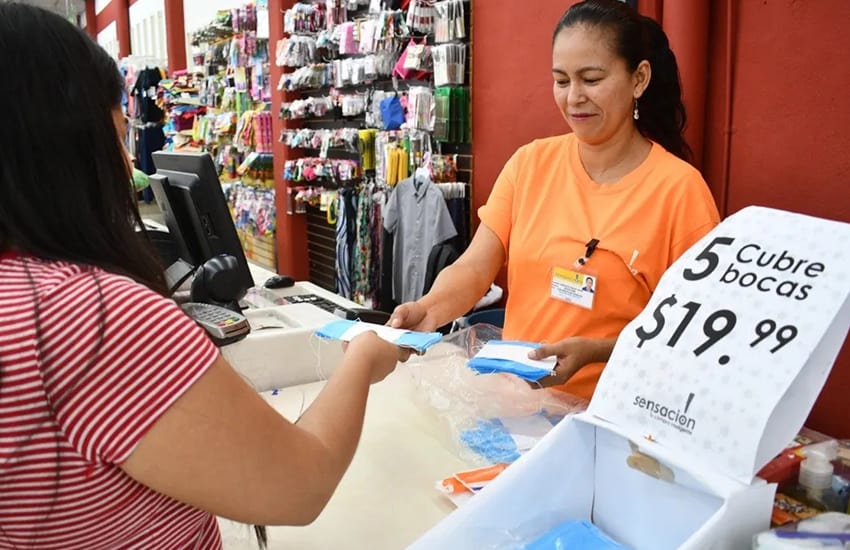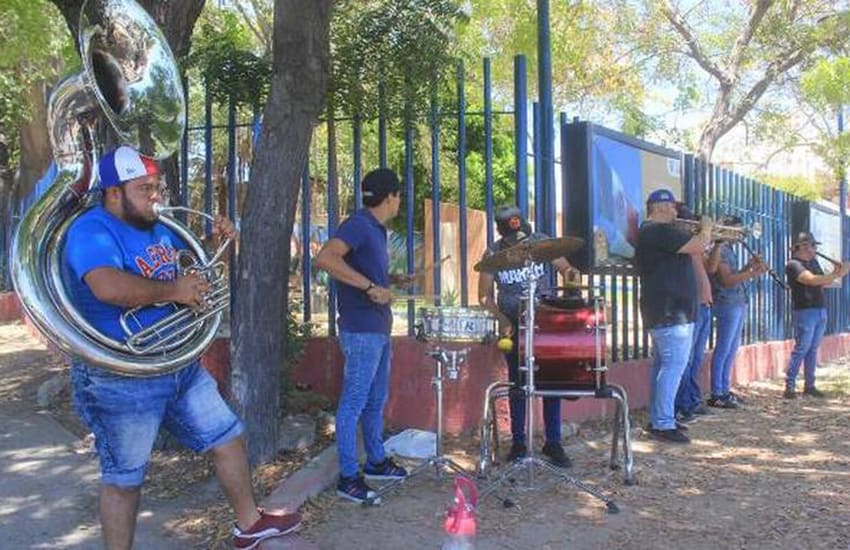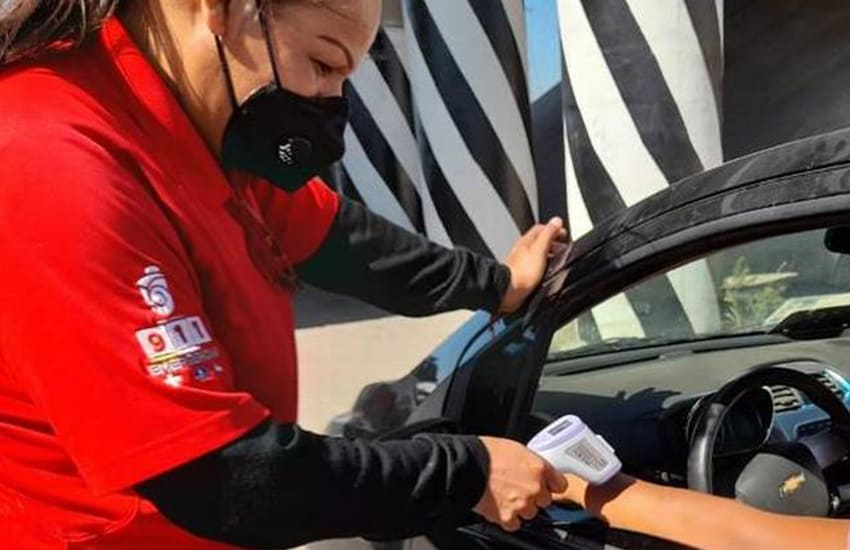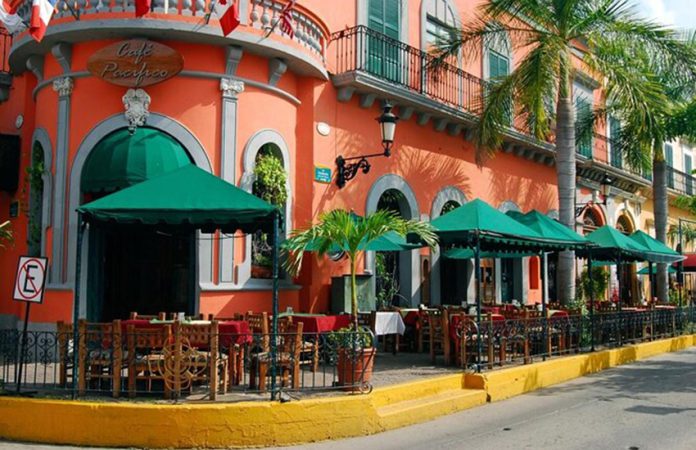In the early stages of the Covid-19 pandemic, when the local pharmacies had been plundered for masks, we bought a box of 20 from a vendor on Mercado Libre for 980 pesos.
Two months ago, from the same vendor, I bought a box of 50 for 85 pesos.
This is just one example of what a long, strange trip it’s been.
As a country, Mexico seems to bumble right along with the distinct appearance that no one is actually in charge. Enforcing the coronavirus restrictions started off well enough, but even just a month into it, things were getting slack.
All stores that were open required customers to wear masks. The bouncers at the door — charged with keeping entrants to a certain number and ensuring that each stepped carefully onto the mat of supposedly anti-viral liquid — would take your temperature. They did that while squirting a dollop of mucilaginous sanitizer in your palm.

Of the people on the streets, about half were wearing masks. But many of the masks were positioned below the nose.
As 2020 wore on, the sickness spread and the death toll climbed. Everybody knew many families that had been badly hit. The crowds outside the hospitals were pictured daily in the newspapers, and articles explained that there were no more beds and people were being sent home to die.
Gradually, eventually, 98% of the people on the streets were wearing masks in a fashion approaching the approved method, with just a few noses showing.
For me and The Captured Tourist Woman (TCTW), voluntary extrication from all face-to-face social activities began in early March of 2020.
The good news is that we love our home, so it felt more like a vacation and less like incarceration. The bad news was only seeing our friends on Zoom. But we quickly learned that sharing drinks virtually wasn’t so bad: we could be completely unkempt from the chest down; that freedom was somewhat liberating.
Then 90% of the businesses here were shuttered and the beaches were closed. They eventually forbade the sale of alcohol. The airlines suspended services in April 2020 as snowbird friends frantically scrambled to find a way home.
While most of North America was hoarding toilet paper, we stocked up on copious quantities of our favorite adult beverages. We figured if the lockdown continued and the city forbade the sale of alcohol, in a few months we could trade bottles of mediocre wine for large amounts of toilet paper; we’d have both ends covered.
Several months into the lockdown, the troubadours and the roving bands that depend upon tourism were in desperate straits.
Ramón, whom we have known for more than 10 years, is a local minstrel who spends his day roving the beaches and sidewalk cafes, seeking pesos for traditional ballads. On one of my weekly trips to the centro mercado (central market), I saw Ramón wandering through a row of closed cafes with his battered guitar hanging at his side.
I stopped and handed him a 200-peso note and watched his whole demeanor transform. His gushing gratitude could have been embarrassing if we weren’t the only people in that block.
As I pedalled off to the market, I realized Ramón had lost a noticeable amount of weight.
A few weeks after my encounter with him, I began to notice groups of musicians playing on street corners where there were traffic lights. Sometimes there would be groups on opposite corners while their designated bag men circulated through the waiting cars, collecting coins. I and several people in my lane put something in the can — community supporting community.

One day, the TCTW heard the distant sound of musicians on the move. She went outside to greet them about a half block away and gave them 200 pesos. They watched her retreat into our house, so they gathered right in front to serenade their new benefactor.
There are basically three types of music played by the various troupes who ply the cafes and beaches of Mazatlán: ballads, mariachi and banda. Banda was created in the 1930s in a village just east of the city and is a combination of bad polka and the arbitrary clashing of drums and horns at great volume played, in operatic terms, “with gusto.”
Well, the group that set up in front of our home was an eight-member banda ensemble. The multiple snare drums and trumpets, backed up by a tuba and a trombone, shattered the relative quiet of the neighborhood. It sounded like banshees were falling from the sky.
After 20 minutes of energetic performing in 90-degree heat, they wandered off, seeking other patrons. We emerged from hiding and reopened our windows.
Two days later, they were back with just as much enthusiasm and volume; we had inadvertently created a cacophonous trend.
Our own up-close-and-personal exposure to the virus came about in July of 2020 when I had a brief conversation with a proud and ardent anti-masker. I was eating an ice cream cone at the time, so my mask was off. The super-spreader probably didn’t own one.
Of course, I passed the Covid infection he gave me on to TCTW, whose symptoms began as a total body rash and escalated from there. Our regular doctor had died of Covid, so we started the process of finding her a doctor with sufficient knowledge of the disease ASAP.
Finding the doctor was an odyssey in itself.
Like so many things here in Mexico, asking someone the question “Can you ________?” will invariably bring about a positive response, delivered with the enthusiastic certainty of a skilled professional.
This ardent assurance is ubiquitous throughout the working population: bankers, carpenters, masons, accountants, mechanics, plumbers and, of course, doctors. An enthusiastic pitch is frequently based upon factors that have nothing to do with actual competence.
Having spent most of my life in the building trade, I can successfully evaluate the skills of a plumber, a carpenter, an electrician and others. But how do you evaluate the expertise of a doctor without having a degree in medicine or at least a couple of years in med school?
This very Mexican conundrum is dealt with by seeking referrals from someone who has actually had a particular doctor successfully solve a pressing medical issue. Since neither one of us wished to attend medical school at our advanced age, we went the referral route.

All across Mexico, all the expat enclaves have some type of online forum or Facebook page by which they share information that is constantly being scoured by gringos needing referrals for plumbers, masons, carpenters and, of course, reliable doctors.
Compounding our difficulties was the unsettling issue, of which we have long been aware, that anyone and everyone who would come forward on these forums with a referral would declare their doctor to be “absolutely the best in town.” And that is exactly what happened.
Part 2 is soon to come, so stay tuned to find out if we eventually found a competent Covid doctor. Learn something about the Mexican hospital experience. But most of all, find out whether TCTW lives through the deadly plague.
The writer describes himself as a very middle-aged man who lives full-time in Mazatlán with a captured tourist woman and the ghost of a half-wild dog. He can be reached at [email protected].
